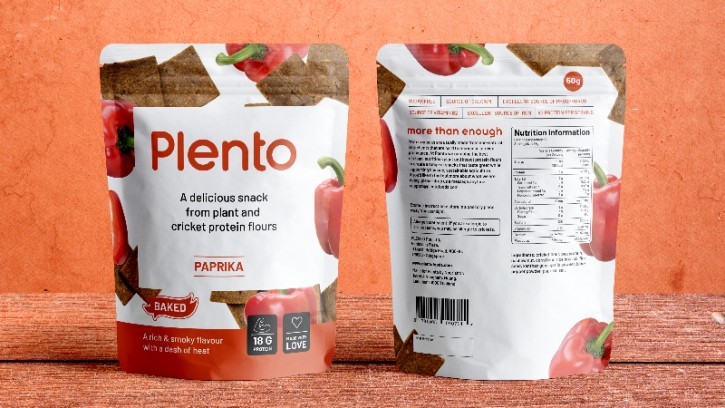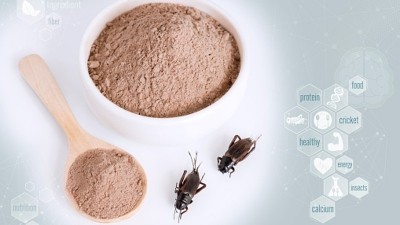Best of both worlds: Plento to debut nutrient-rich snacks made from pea protein and cricket flour in South Korea

Plento’s baked crisps are created with pea protein, cashew nut flour, flax seed, and cricket flour — the result of nearly three years of development at Singapore Polytechnic’s Food Innovation & Resource Centre (FIRC).
The firm is a joint venture between Bugsolutely Bangkok and Asia Insect Farm Solutions (AIFS) Singapore.
Massimo Reverberi, founder of Plento, believes that the company is the first to combine plant-based and insect protein to leverage the “advantages of both”.
“Our snacks provide a spectrum of nutritional benefits, including high levels of protein (37%) without high levels of carbohydrates. They are also rich in calcium, iron, magnesium, and phosphorus. Unlike soy protein commonly found in other snacks, Plento’s pea-cricket flour formula provides nine essential amino acids.
“Plant-based protein is a more sustainable alternative to animal protein, but it does not provide all the amino acids that one may need. Nutritionally speaking, insects are the best meat we can think of, so that’s where our idea came from,” he told FoodNavigator-Asia.
While Bugsolutely started with cricket pasta about eight years ago, Reverberi observed that snacks may be better received in Asia, leading to the birth of Plento.
In February, Plento will introduce its snacks in South Korea, making the country its first launch market.
“We are working with a local partner in the food import business. In the pilot phase, the crisps will be available in online shops and a couple of retailers so that we can collect data. Apart from tracking sales, we want to see how Koreans appreciate our products.
“Consumers across Asia, including Koreans, Japanese and Thais, have very different taste preferences. I’ve exported cricket pasta to Korea in the past, so I’m not too worried about consumer acceptance of edible insects. More importantly, we want to get their feedback on the taste and better understand their preferences.”
Other countries that the company is looking to explore are Japan, Singapore, Australia and Thailand.
“We initially targeted Singapore because the local authority Singapore Food Agency (SFA) had started reviewing insects for human consumption a few years back.
“Although they announced the approval last April, there are still no detailed regulations stipulated for importing and selling. As our products are manufactured in Thailand, they cannot be exported to Singapore at the moment,” Reverberi added.
Overcoming the “yuck factor”
While nutrition and sustainability are key messages to raise consumer acceptance, edible insects are essentially a type of food, of which taste is of equal — if not more — importance.
In this regard, Reverberi thinks that the energy bars category is overly saturated and that snacks is an interesting approach to ameliorate the “yuck factor”.
“Most people have the preconception that insects do not taste good. Some say that insects are a food of the future when humans have ‘no choice’ due to depleting resources on the planet. There is also research suggesting that people have been taught from young that insects are not food and should not be eaten.
“Taste is paramount for selling any product in the food market. In the case of insects, it is even more crucial to debunk myths about their taste. It was a very lengthy process to develop our formula to meet the nutrition profile that we want and ensure it is delicious.”
Plento’s baked crisps are currently available in two flavours, namely Paprika and Rosemary, with a third one, Tomato Oregano, planned for release during later part of this year.
“We tested dozens of seasonings to see which ones pair well with the flours that we use. Paprika and rosemary may seem a little more Western than Eastern, but a lot of Asians are starting to appreciate things like oregano, vinegar and salt, so I think these two flavours are a good start.
“Moreover, flavours such as BBQ don’t sound exactly healthy. Our baked snacks, offered in 50g packages, are not too salty and not too sweet, and are health foods that don’t taste like health foods.”
Even though regulatory approval and consumer acceptance remain barriers to sector growth, they are not the only challenges faced by insect food companies.
For instance, the cost of insects is still relatively high as production has not scaled up yet.
Another obstacle is distribution — persuading retailers to stock these products “has never been easy”, not just for Bugsolutely or Plento but most start-ups, according to Reverberi.
“Many start-ups have focused on selling their insect-based products online, but I don’t think this is the customer experience that would help consumers overcome the psychological barrier and win them over.
“We have to get people to try and see for themselves that insects don’t taste bad, as well as convince distributors and retailers, such as supermarkets, to at least give these products a chance on the shelves and see how they perform.”













